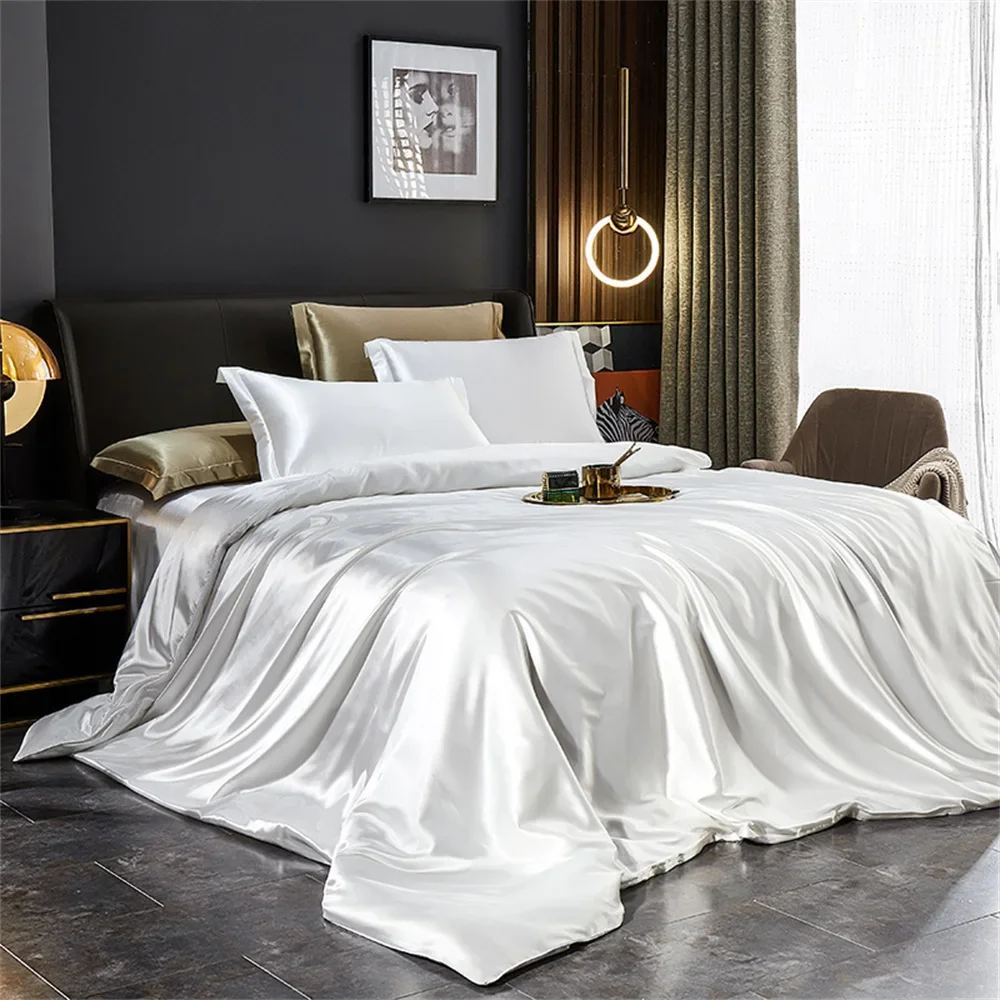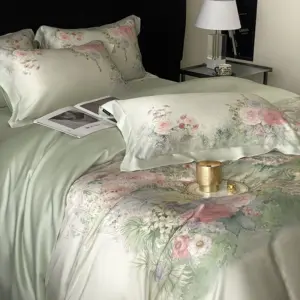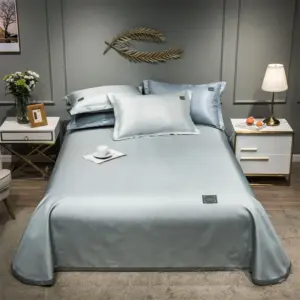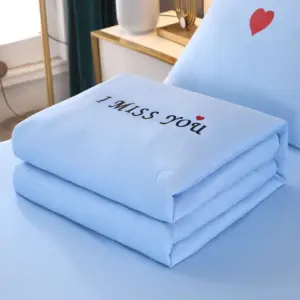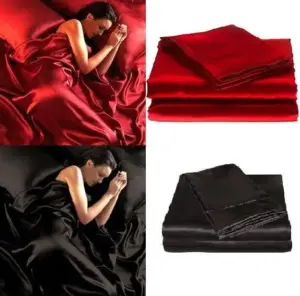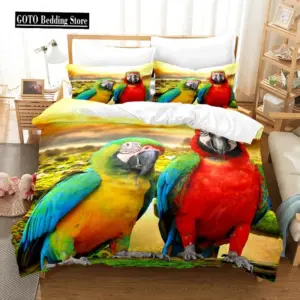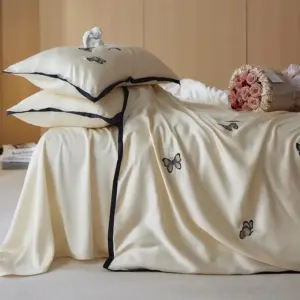Introduction: The Ethical Luxury Revolution in Bedding
The world of luxury bedding is experiencing a revolutionary shift. Vegan silk—a remarkable plant-based alternative to traditional silk—now offers the indulgence of silky-soft bedding without animal exploitation. This innovative fabric delivers the same luxurious feel while aligning with ethical values that many of us hold dear.
Today’s conscious consumers increasingly demand bedding options that match their ethical standards without sacrificing comfort. This growing movement has sparked incredible innovations in textile development, allowing us to enjoy sumptuous bedding that’s kind to animals, our bodies, and the planet.
As we explore vegan silk bedding, you’ll discover a world of benefits spanning four essential categories: unparalleled comfort, remarkable health advantages, positive environmental impact, and exceptional value. The properties of these plant-based textiles not only rival traditional benefits of Mulberry silk sheets but often surpass them in multiple ways.
Are you ready to transform your sleep experience while honoring your commitment to ethical living? Let’s explore how vegan silk bedding can elevate your nightly routine into a truly luxurious experience—without compromise.
What Is Vegan Silk? Understanding the Innovative Fabric
Vegan silk refers to plant-based textiles that successfully replicate the luxurious properties of traditional silk without using animal products. Unlike conventional silk production, which involves harvesting silk from silkworm cocoons (often boiling the cocoons with the worms inside), vegan silk derives entirely from botanical sources.
These innovative fabrics come in several varieties, each with unique properties:
Tencel Lyocell (Eucalyptus silk) – Created from sustainably harvested eucalyptus trees, this material stands out for its remarkable closed-loop production process. The solvents used to transform wood pulp into fiber are recycled with a recovery rate of over 99%, minimizing environmental impact while creating an exceptionally smooth fabric.
Bamboo Lyocell – Derived from rapidly renewable bamboo, this material combines sustainability with natural breathability. The bamboo source grows incredibly quickly without pesticides or fertilizers, requiring minimal water compared to cotton.
Cupro – This innovative fabric transforms cotton industry waste—specifically the fluffy fibers (linters) surrounding cotton seeds—into a silky, biodegradable material with exceptional draping qualities and moisture management.
Modal – Produced from beech trees, modal offers enhanced durability while maintaining silk-like softness. Its production requires less water than conventional cotton and results in a fabric resistant to shrinkage and pilling.
The ethical distinction between traditional and vegan silk is significant. While conventional silk production involves the sacrifice of silkworms, plant-based alternatives eliminate this ethical concern entirely. This innovation represents the textile industry’s response to growing consumer demand for products that align with compassionate values.
Understanding the pros and cons of silk versus vegan silk helps consumers make informed decisions that align with both their comfort preferences and ethical values. The development of these materials showcases how innovation can satisfy luxury demands without ethical compromise.
Superior Sleep Quality: How Vegan Silk Transforms Your Rest
Vegan silk bedding creates an optimal sleep environment through several remarkable properties that directly impact your rest quality. The exceptional benefits of these plant-based fabrics can transform ordinary sleep into a rejuvenating experience night after night.
One of vegan silk’s most impressive qualities is its temperature regulation capability. Unlike synthetic materials that trap heat or cotton that can feel cool but doesn’t adapt, vegan silk fabrics actively respond to your body temperature. During warm nights, they efficiently wick away excess heat and moisture. In cooler seasons, these same fibers provide gentle insulation. This natural thermoregulation helps maintain your body’s ideal sleep temperature throughout the night.
The moisture management properties further enhance sleep quality:
– Absorbs up to 70% more moisture than cotton without feeling damp
– Wicks perspiration away from skin to evaporate efficiently
– Keeps bedding feeling fresh and dry throughout the night
– Reduces discomfort from night sweats or high humidity environments
Perhaps most immediately noticeable is the extraordinarily soft texture. The microscopic smoothness of vegan silk fibers creates a buttery-soft surface that rivals—and many users say exceeds—traditional silk’s feel. This gentle touch against skin minimizes friction and irritation that could otherwise disrupt sleep.
These combined properties directly contribute to deeper, more consistent rest by eliminating common sleep disruptors. When your body can maintain optimal temperature and moisture levels while resting against an incredibly soft surface, you experience fewer midnight awakenings and more complete sleep cycles.
The connection between quality sleep and overall wellness cannot be overstated. By transforming sleep quality with specialized bedding, vegan silk contributes to improved daytime energy, enhanced cognitive function, and better overall health.
Skin Health Benefits: Your Overnight Beauty Treatment
Vegan silk bedding works as an overnight beauty treatment through its unique interaction with your skin. The ultra-smooth surface created by plant-based fibers minimizes friction against facial skin, unlike rougher conventional fabrics that can tug and pull as you move during sleep.
This reduced friction delivers several notable skin benefits:
– Prevention of sleep creases and lines that can become permanent over time
– Minimized irritation for sensitive or reactive skin types
– Reduced friction-based inflammation that can trigger breakouts
– Preservation of skincare products, allowing them to work effectively overnight rather than being absorbed by bedding
The hypoallergenic nature of plant-based vegan silk provides additional skin advantages. These fibers naturally resist dust mites, mold, and mildew—common allergens that can trigger skin reactions in sensitive individuals. The smooth fiber structure also prevents the accumulation of skin cells and bacteria that might irritate skin.
Perhaps most impressive is how vegan silk helps maintain your skin’s natural moisture balance. Unlike cotton, which can absorb moisture from your skin and hair, vegan silk allows your skin to retain its natural hydration levels. This moisture preservation helps prevent the dryness that contributes to premature aging and skin irritation.
Before switching to vegan silk, many users experience morning puffiness, visible sleep lines, and skin dryness. After incorporating vegan silk into their sleep routine, they notice smoother morning skin, fewer irritation issues, and better retention of overnight skincare products.
These skin advantages closely mirror the renowned skin benefits of mulberry silk bedding, with the added satisfaction of choosing a cruelty-free alternative. By protecting skin from unnecessary friction and preserving moisture, vegan silk creates an optimal environment for overnight skin renewal.
Hair Care Advantages: Frizz-Free Mornings and Healthier Strands
Vegan silk bedding offers remarkable benefits for hair health and appearance, making those perfect hair days more frequent with less effort. The secret lies in the incredibly smooth surface that dramatically reduces friction against your hair while you sleep.
This friction reduction delivers significant hair advantages:
- Minimizes breakage and split ends by eliminating the tugging and pulling that occurs with conventional fabrics
- Reduces frizz formation by allowing hair to glide across the pillowcase rather than creating static and disrupting the hair cuticle
- Preserves hairstyles longer, especially beneficial for curly hair textures that can lose definition against rougher fabrics
- Maintains natural hair oils instead of absorbing them, preventing unnecessary dryness
Different hair types experience unique benefits from vegan silk bedding. Those with curly or textured hair find their curl pattern remains more defined and less frizzy. People with fine or fragile hair experience less breakage and improved thickness over time. Those with color-treated hair may notice longer-lasting color vibrancy since reduced friction means less color fading.
Vegan silk’s ability to maintain your hair’s natural moisture balance is particularly significant. Unlike cotton pillowcases that absorb beneficial oils from your hair, leaving it dry and prone to damage, vegan silk allows these natural conditioning agents to remain where they belong—in your hair.
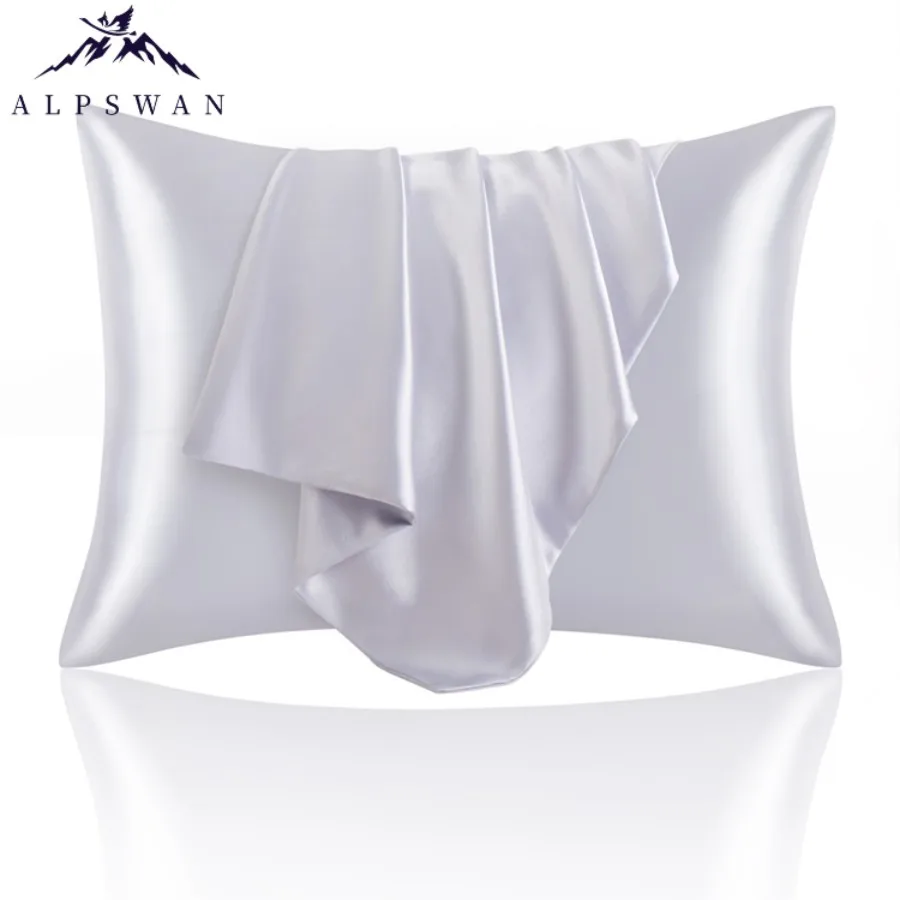
The collective result is noticeably healthier hair with less daily maintenance required. Many users report reduced styling time, decreased need for heat styling tools, and an overall improvement in hair health after switching to vegan silk pillowcases. These benefits closely mirror those of traditional silk fabrics for hair health while offering an ethical alternative.
Environmental Sustainability: The Eco-Friendly Choice
Vegan silk production represents a significant environmental advancement compared to both traditional silk and conventional bedding materials. The sustainable methods used to create these plant-based alternatives deliver measurable ecological benefits at every production stage.
The resource efficiency of vegan silk production is particularly noteworthy when comparing water and land usage:
- Eucalyptus for Tencel requires up to 95% less water than cotton cultivation
- Bamboo grows rapidly without irrigation, pesticides, or fertilizers
- Both sources yield significantly more fiber per acre than cotton
- Production requires less energy than petroleum-based synthetics
Closed-loop manufacturing systems represent one of the most impressive environmental innovations in vegan silk production. This process, used particularly with Tencel Lyocell, recycles over 99% of the solvents used to transform plant cellulose into fiber. This circular approach dramatically reduces waste, water consumption, and chemical runoff compared to conventional textile manufacturing.
The biodegradability of vegan silk materials provides end-of-life advantages that synthetic alternatives cannot match. When properly disposed of, these plant-based fibers return to the earth within months to years, compared to synthetic fabrics that may persist for centuries. This complete lifecycle consideration makes vegan silk a truly sustainable choice.
The environmental impact difference becomes clear when examining the full picture:
– Conventional cotton: High water usage, heavy pesticide application, significant processing chemicals
– Traditional silk: Lower direct environmental impact but involves animal use
– Synthetic fabrics: Petroleum-derived, non-biodegradable, microplastic shedding
– Vegan silk: Renewable resources, minimal water usage, biodegradable, often closed-loop production
By choosing eco-conscious silk bedding alternatives, consumers actively contribute to reduced environmental impact while still enjoying luxury bedding. This alignment of environmental values with personal comfort represents the ideal intersection of sustainability and luxury.
Ethical Production: Cruelty-Free Luxury Without Compromise
Traditional silk production involves a process many consumers find troubling once they understand it. Conventional silk harvesting requires boiling silkworm cocoons with the pupae still inside—approximately 6,600 silkworms are sacrificed to produce just 2.2 pounds (1 kg) of silk. This practice stands at odds with the growing consumer preference for cruelty-free products.
Vegan silk eliminates this ethical concern entirely by deriving luxurious fabrics exclusively from plant sources. This cruelty-free approach satisfies the increasing consumer demand for products that align with compassionate values without sacrificing quality or comfort.
The ethical considerations often extend beyond animal welfare. Many manufacturers of vegan silk materials emphasize fair labor practices and safe working conditions as core values. Certifications like OEKO-TEX Standard 100 and Fair Trade designations frequently accompany premium vegan silk products, verifying their ethical production standards.
Consumer choices drive industry innovation in profound ways. As demand for cruelty-free alternatives grows, manufacturers invest more resources into developing and refining plant-based textiles. This market influence extends beyond individual purchasing decisions to reshape industry priorities and practices.
The most remarkable achievement of vegan silk is how it eliminates the false dichotomy between luxury and ethics. Previous generations may have accepted that ethical products would be inferior in quality or comfort. Today’s vegan silk proves this assumption wrong by delivering exceptional luxury while honoring ethical commitments.
The growing availability of sustainable silk bedding choices demonstrates how consumer values increasingly shape product development. By choosing vegan silk bedding, consumers actively support continuing innovation in ethical luxury textiles.
Durability and Longevity: A Worthwhile Investment
Vegan silk bedding delivers impressive durability thanks to the inherent strength of its plant-based fibers. Unlike common misconceptions about delicate alternative textiles, properly manufactured vegan silk offers resilience that translates to years of beautiful use.
The molecular structure of plant cellulose fibers gives vegan silk its remarkable strength. These long, flexible molecules align during manufacturing to create exceptionally strong threads that resist tearing and pilling. Eucalyptus-based Tencel and bamboo-derived fibers actually gain strength when wet—unlike traditional silk which becomes more vulnerable to damage during washing.
With proper care, vegan silk bedding typically lasts:
– 3-5 years with regular use and proper washing
– Often outlasting traditional silk which may show wear within 1-2 years
– Comparable to high-quality cotton but with superior retention of softness and appearance
Care requirements for vegan silk are surprisingly simple:
– Machine washable in cold water (unlike traditional silk requiring dry cleaning)
– Gentle cycle with mild detergent
– Tumble dry on low heat or air dry
– No need for special silk detergents or handwashing
This ease of maintenance contributes significantly to the overall value proposition. When bedding can be conveniently machine washed rather than requiring professional cleaning, the lifetime maintenance costs decrease dramatically while extending the fabric’s usable life.
Vegan silk’s durability doesn’t come at the expense of comfort—these fabrics maintain their characteristic softness through proper washing, showing remarkable resilience compared to other bedding materials that may become rough or pill over time.
For those seeking particularly durable options, bamboo silk bedding sets often offer exceptional longevity due to the naturally robust fiber structure. This combination of durability, easy care, and maintained luxury feel establishes vegan silk as a sound long-term investment rather than a disposable purchase.
Cost-Effectiveness: Luxury That Makes Financial Sense
Vegan silk bedding represents an excellent value proposition when considering its full cost-benefit analysis. While the initial investment typically exceeds standard cotton bedding, several factors contribute to its overall cost-effectiveness.
When comparing price points across premium bedding options:
| Bedding Material | Typical Queen Set Price Range | Care Requirements | Expected Lifespan |
|---|---|---|---|
| Vegan Silk | $100-250 | Machine wash | 3-5 years |
| Traditional Silk | $300-800+ | Dry clean/hand wash | 2-3 years |
| Egyptian Cotton | $150-400 | Machine wash | 3-4 years |
| Standard Cotton | $50-120 | Machine wash | 1-2 years |
The maintenance cost difference creates significant savings over time. Traditional silk often requires professional dry cleaning or careful hand washing, adding substantial ongoing costs. Vegan silk’s machine-washable nature eliminates these expenses entirely.
The durability factor further enhances value. While the initial investment may be 30-50% higher than basic cotton, the extended lifespan means you’ll replace your bedding less frequently. This long-term perspective reveals the true value proposition—higher quality sleep and fewer replacement purchases over time.
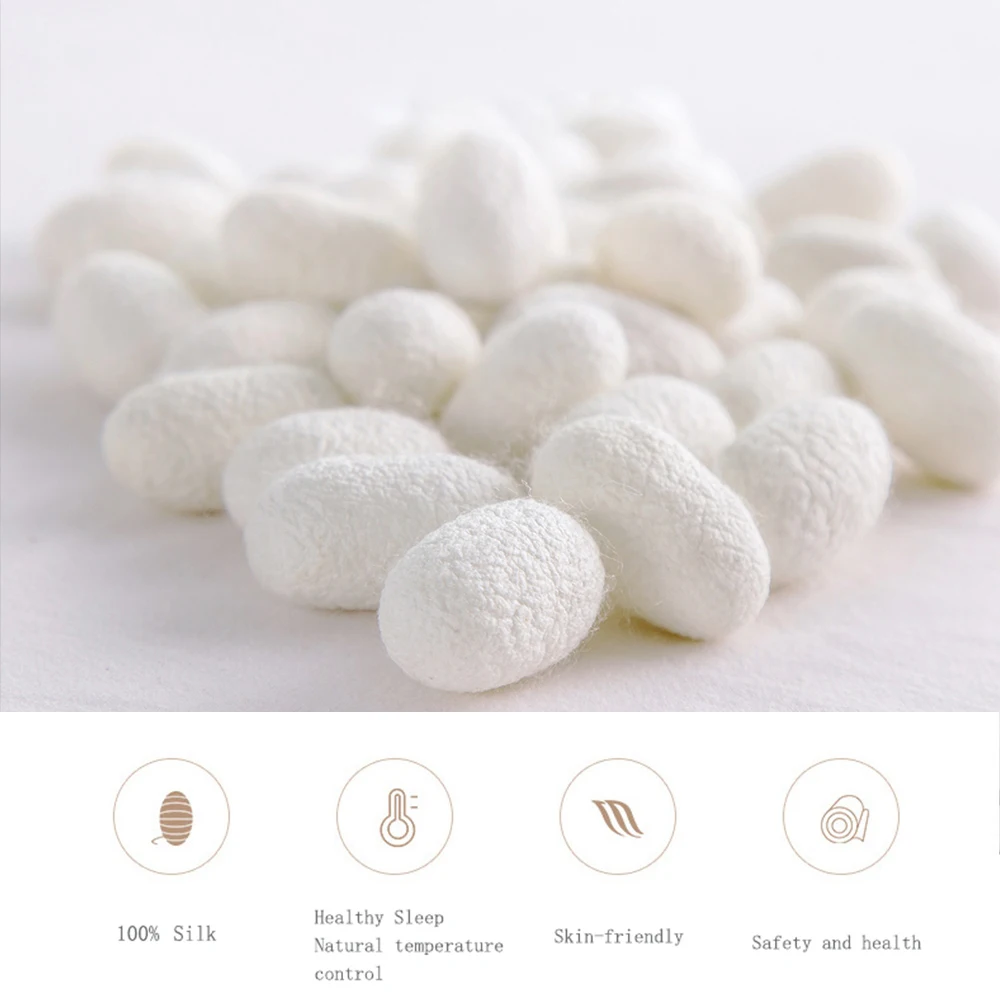
When considering all factors—initial cost, maintenance requirements, lifespan, and sleep benefits—vegan silk emerges as surprisingly affordable luxury. The accessibility of eucalyptus silk sheets and other vegan options has made premium sleep experiences available to more consumers than ever before, representing true democratic luxury.
Vegan Silk vs. Traditional Options: A Comprehensive Comparison
Understanding how vegan silk compares to other popular bedding options helps clarify its unique position in the luxury bedding market. Each material offers distinct properties worth considering when making your selection.
Feel and Comfort
Vegan silk offers remarkable smoothness rivaling traditional silk, with a slightly cooler initial touch. Cotton provides familiar comfort but lacks the frictionless surface. Polyester often attempts to mimic silk but typically falls short in breathability. Linen delivers excellent airflow but with a characteristic texture some find too rough.
Temperature Regulation
Vegan silk excels here, adapting to body temperature while efficiently wicking moisture. Traditional silk offers similar benefits but may retain slightly more heat. Cotton breathes well but can trap moisture when damp. Polyester typically traps heat and moisture. Linen provides exceptional cooling but may feel cold in winter months.
Durability Considerations
Vegan silk demonstrates impressive resilience, especially with proper care. Traditional silk, while luxurious, requires delicate handling and typically shows wear sooner. Quality cotton can last for years but may pill or become rough. Polyester lasts longest but often deteriorates in feel. Linen increases in softness over time with legendary longevity.
Maintenance Requirements
Vegan silk offers machine washability with minimal special care. Traditional silk generally requires dry cleaning or careful hand washing. Cotton provides the easiest care with standard machine washing. Polyester also allows simple machine washing but may develop odors over time. Linen can be machine washed but wrinkles considerably.
Environmental Impact
Vegan silk from sustainably managed sources with closed-loop processing offers minimal environmental impact. Traditional silk requires fewer chemicals than cotton but involves animal use. Conventional cotton has significant water and pesticide concerns. Polyester, as a petroleum product, carries substantial environmental concerns. Linen offers excellent sustainability but with higher water requirements than some vegan silk sources.
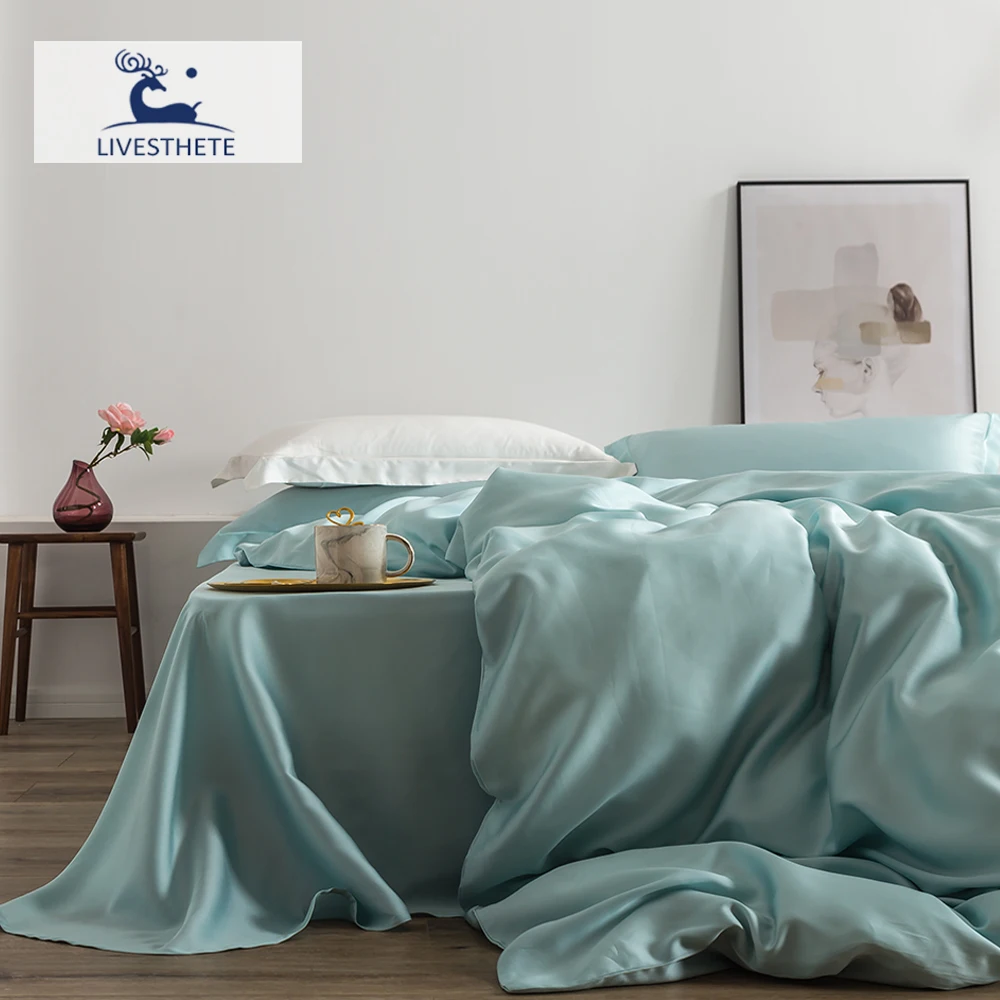
This comparison reveals why vegan silk has gained popularity—it effectively combines the luxury experience of traditional silk with improved durability and ethical advantages. For comprehensive details about traditional options, exploring the complete guide to Mulberry silk bed sheets provides valuable context for this comparison.
Addressing Common Questions About Vegan Silk Bedding
Is vegan silk truly as soft as traditional silk?
Yes, high-quality vegan silk rivals traditional silk in softness. While the feel has subtle differences—vegan silk typically feels slightly cooler initially—both provide exceptional smoothness. Many users actually prefer vegan silk’s texture, finding it equally luxurious with improved durability.
How do I properly care for vegan silk bedding?
Vegan silk requires simpler care than traditional silk. Machine wash in cold water on a gentle cycle using mild detergent. Avoid fabric softeners and bleach. Tumble dry on low heat or air dry. No ironing is typically necessary, but if desired, use a cool iron setting.
Will vegan silk bedding help with night sweats or hot flashes?
Absolutely. Vegan silk excels at temperature regulation and moisture management. The fibers wick moisture away from the body while allowing air circulation, creating a significantly cooler sleep environment than synthetic or cotton alternatives. Many users report dramatic improvement in comfort during night sweats or hot flashes.
Is vegan silk bedding suitable for people with allergies?
Vegan silk is naturally hypoallergenic, making it excellent for allergy sufferers. The smooth fiber structure resists dust mites, mold, and mildew—common allergens found in bedding. Additionally, the production process typically uses fewer chemicals than conventional cotton processing, further reducing potential irritants.
How long does vegan silk bedding typically last?
With proper care, high-quality vegan silk bedding lasts 3-5 years of regular use. This compares favorably to traditional silk (which may show wear after 1-2 years without careful maintenance) and standard cotton (which often pills or becomes rough within 1-2 years).
Does vegan silk wrinkle easily?
Vegan silk has moderate wrinkle resistance—better than traditional silk or cotton but not completely wrinkle-free. Any wrinkles typically release after a short time on the bed due to the fabric’s natural weight and drape. For a perfectly smooth look, removing promptly from the dryer or gently stretching while air drying minimizes wrinkles.
Are there different grades or quality levels of vegan silk?
Yes, vegan silk quality varies based on fiber source, processing methods, and weave. Higher quality vegan silk features consistent fiber length, controlled processing to preserve smoothness, and appropriate weight for the intended use. When shopping, look for detailed material information and manufacturing transparency as quality indicators.
For those interested in exploring bamboo-based options specifically, bamboo silk sheets offer an excellent introduction to vegan silk’s benefits with particular strengths in durability and temperature regulation.
How to Choose the Right Vegan Silk Bedding for Your Needs
Selecting the perfect vegan silk bedding requires consideration of several key factors to match your specific preferences and needs. This thoughtful approach ensures you’ll select bedding that delivers the greatest satisfaction for your unique situation.
Consider these essential selection criteria:
Material preference: Eucalyptus-based Tencel offers exceptional cooling and moisture management. Bamboo provides outstanding durability and softness. Cupro delivers the closest feel to traditional silk. Modal balances softness with strength.
Weight and texture: Lighter weights (around 250 GSM) create a floaty, cool feel ideal for warm sleepers. Medium weights (300-350 GSM) balance drape with substance for year-round use. Heavier options (400+ GSM) provide cozy warmth for cooler climates.
Construction quality: Look for double-stitched seams, quality closures (enveloped pillowcases, strong buttons or ties for duvet covers), and consistent coloration throughout.
Color considerations: Darker colors showcase vegan silk’s characteristic luster more dramatically. Lighter colors highlight its smooth surface. Consider your existing décor and personal color preferences.
Eucalyptus Silk Bedding Sets, Eucalyptus Silk Sheets
Price range: $360.24 through $393.60 Select options This product has multiple variants. The options may be chosen on the product page- Price range: $267.82 through $306.55 Select options This product has multiple variants. The options may be chosen on the product page
Bamboo Silk Sheets, Cooling Silk Sheets
Price range: $130.76 through $177.80 Select options This product has multiple variants. The options may be chosen on the product pageBamboo Silk Sheets, Queen Size Silk Fitted Sheet
Price range: $230.24 through $297.88 Select options This product has multiple variants. The options may be chosen on the product page- 100% Bamboo Fiber Parrot Duvet Cover Set – Queen King Twin Size Tropical Bedding for Comfort & StylePrice range: $241.95 through $380.95 Select options This product has multiple variants. The options may be chosen on the product page
Bamboo Silk Bedding Sets, Bamboo Silk Sheets, King Size Silk Pillowcases, Queen Size Silk Pillowcases
Price range: $376.20 through $402.27 Select options This product has multiple variants. The options may be chosen on the product page
When assessing quality, examine several key indicators. Higher-quality vegan silk displays consistent texture without slubs or irregularities. The weight should feel substantial but not heavy. Premium products often feature more detailed information about their specific fiber sourcing and manufacturing processes.
For those with specific sleep concerns, certain vegan silk varieties offer targeted benefits. Hot sleepers or those with night sweats may prefer eucalyptus-based options for maximum cooling. Those prioritizing durability might select bamboo-derived fabrics. Sensitive skin types often find cupro exceptionally gentle.
Sanctuary Soft’s eucalyptus silk bedding sets provide an excellent starting point for exploring these ethical luxury options with carefully balanced properties suited to various preferences.
By considering these factors thoughtfully, you can select vegan silk bedding that perfectly complements your sleep style, ethical values, and comfort preferences—creating your ideal sleep sanctuary for years to come.

